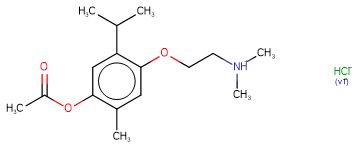
Moxisylyte hydrochloride
CAS No. 964-52-3
Moxisylyte hydrochloride( Arlitene, Carlytene, Enfrental, Limatene, M-101, Moxilite, Enfrental Limatene M-101 Moxilite Moxisylyte HCl )
Catalog No. M16866 CAS No. 964-52-3
An alpha-adrenergic blocking agent that is used in Raynaud's disease.
Purity : >98% (HPLC)
 COA
COA
 Datasheet
Datasheet
 HNMR
HNMR
 HPLC
HPLC
 MSDS
MSDS
 Handing Instructions
Handing Instructions
| Size | Price / USD | Stock | Quantity |
| 50MG | 32 | In Stock |


|
| 100MG | 45 | In Stock |


|
| 200MG | Get Quote | In Stock |


|
| 500MG | Get Quote | In Stock |


|
| 1G | Get Quote | In Stock |


|
Biological Information
-
Product NameMoxisylyte hydrochloride
-
NoteResearch use only, not for human use.
-
Brief DescriptionAn alpha-adrenergic blocking agent that is used in Raynaud's disease.
-
DescriptionAn alpha-adrenergic blocking agent that is used in Raynaud's disease. It is also used locally in the eye to reverse the mydriasis caused by phenylephrine and other sympathomimetic agents.
-
In Vitro——
-
In Vivo——
-
SynonymsArlitene, Carlytene, Enfrental, Limatene, M-101, Moxilite, Enfrental Limatene M-101 Moxilite Moxisylyte HCl
-
PathwayEndocrinology/Hormones
-
TargetAdrenergic Receptor
-
RecptorAdrenergic Receptor
-
Research AreaCardiovascular Disease
-
Indication——
Chemical Information
-
CAS Number964-52-3
-
Formula Weight315.84
-
Molecular FormulaC16H26ClNO3
-
Purity>98% (HPLC)
-
SolubilityDMSO: 10 mM
-
SMILESc1(c(cc(C)c(c1)OC(C)=O)OCC[NH+](C)C)C(C)C.[ClH-]
-
Chemical NameCarvacrol, 5-(2-(dimethylamino)ethoxy)-, acetate (ester), hydrochloride (8CI)
Shipping & Storage Information
-
Storage(-20℃)
-
ShippingWith Ice Pack
-
Stability≥ 2 years
Reference
1. Imagawa A, et al. Life Sci. 1989;44(9):619-23.
molnova catalog



related products
-
Adrenalone hydrochlo...
Adrenalone hydrochloride is a selective α1-adrenoceptor agonist, used as a topical vasoconstrictor and hemostatic, used to prolong the action of local anesthetics.
-
Phenylephrine hydroc...
Phenylephrine hydrochloride is a selective α1-adrenergic receptor agonist.
-
Anisodamine
Anisodamine, also known as 7β-hydroxyhyoscyamine, is an anticholinergic and α1-adrenergic receptor antagonist.



 Cart
Cart
 sales@molnova.com
sales@molnova.com


